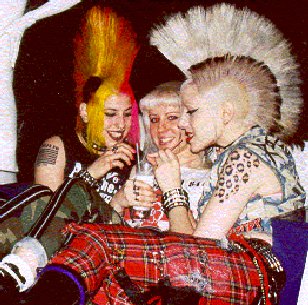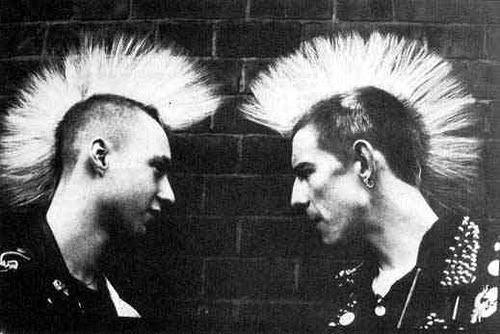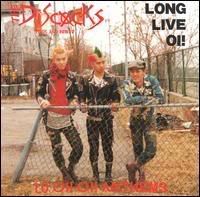



The music and associated subculture had the goal of promoting unity between punks, skinheads and other non-aligned working class youths (sometimes called herberts). The Oi! movement was partly a response to a sense that many participants in the early punk rock scene were, in the words of The Business guitarist Steve Kent, "trendy university people using long words, trying to be artistic...and losing touch".
In the words of André Schlesinger, "Oi shares many similarities with folk music, besides its often simple musical structure; quaint in some respects and crude in others, not to mention brutally honest, it usually tells a story based in truth. The Oi! genre became a recognized genre in the latter part of the 1970s, emerging after the perceived commercialization of punk rock, but still before the soon-to-dominate hardcore punk sound. It fused the sounds of early punk bands such as Sex Pistols, The Clash, the Ramones and The Jam with influences from early British rock bands such as the Rolling Stones and The Who; football chants; pub rock bands such as 101ers and Eddie and the Hot Rods; and glam rock bands such as Slade and Sweet. Direct precursors to the first Oi! bands included Sham 69, Cock Sparrer and Menace, who were around for years before the word Oi! was used retroactively to describe their style of music.
Originally the music style was called street punk, streetpunk, new punk or real punk. Other terms that have been used at certain points are street rock, street rock 'n' roll, Oi!/street punk and streetpunk/Oi!. In 1980, writing in Sounds, rock journalist Garry Bushell labeled the movement Oi!, taking the name from the garbled "Oi!" that Stinky Turner of Cockney Rejects used to introduce the band's songs. The word Oi is an old Cockney expression, simply meaning hey or hello.
Some of the first bands to be explicitly labelled as Oi! were Cockney Rejects, Angelic Upstarts and The 4-Skins. The first wave of Oi! bands was followed by bands such as The Business, Blitz, The Blood, The Last Resort, Combat 84, Infa Riot, The Burial, Condemned 84 and The Oppressed. The general ideology of the original Oi! movement was a rough sort of quasi-socialist working class populism. Lyrical topics included unemployment, workers' rights, harassment by police and other authorities, and oppression by the government.[2] Oi! songs also covered less-political topics such as street violence, football, sex and alcohol. Although Oi! has come to be considered mainly a skinhead-oriented genre, the first Oi! bands were composed mostly of punk rockers and people who fit neither the skinhead nor punk label.
In the words of André Schlesinger, "Oi shares many similarities with folk music, besides its often simple musical structure; quaint in some respects and crude in others, not to mention brutally honest, it usually tells a story based in truth. The Oi! genre became a recognized genre in the latter part of the 1970s, emerging after the perceived commercialization of punk rock, but still before the soon-to-dominate hardcore punk sound. It fused the sounds of early punk bands such as Sex Pistols, The Clash, the Ramones and The Jam with influences from early British rock bands such as the Rolling Stones and The Who; football chants; pub rock bands such as 101ers and Eddie and the Hot Rods; and glam rock bands such as Slade and Sweet. Direct precursors to the first Oi! bands included Sham 69, Cock Sparrer and Menace, who were around for years before the word Oi! was used retroactively to describe their style of music.
Originally the music style was called street punk, streetpunk, new punk or real punk. Other terms that have been used at certain points are street rock, street rock 'n' roll, Oi!/street punk and streetpunk/Oi!. In 1980, writing in Sounds, rock journalist Garry Bushell labeled the movement Oi!, taking the name from the garbled "Oi!" that Stinky Turner of Cockney Rejects used to introduce the band's songs. The word Oi is an old Cockney expression, simply meaning hey or hello.
Some of the first bands to be explicitly labelled as Oi! were Cockney Rejects, Angelic Upstarts and The 4-Skins. The first wave of Oi! bands was followed by bands such as The Business, Blitz, The Blood, The Last Resort, Combat 84, Infa Riot, The Burial, Condemned 84 and The Oppressed. The general ideology of the original Oi! movement was a rough sort of quasi-socialist working class populism. Lyrical topics included unemployment, workers' rights, harassment by police and other authorities, and oppression by the government.[2] Oi! songs also covered less-political topics such as street violence, football, sex and alcohol. Although Oi! has come to be considered mainly a skinhead-oriented genre, the first Oi! bands were composed mostly of punk rockers and people who fit neither the skinhead nor punk label.

No comments:
Post a Comment